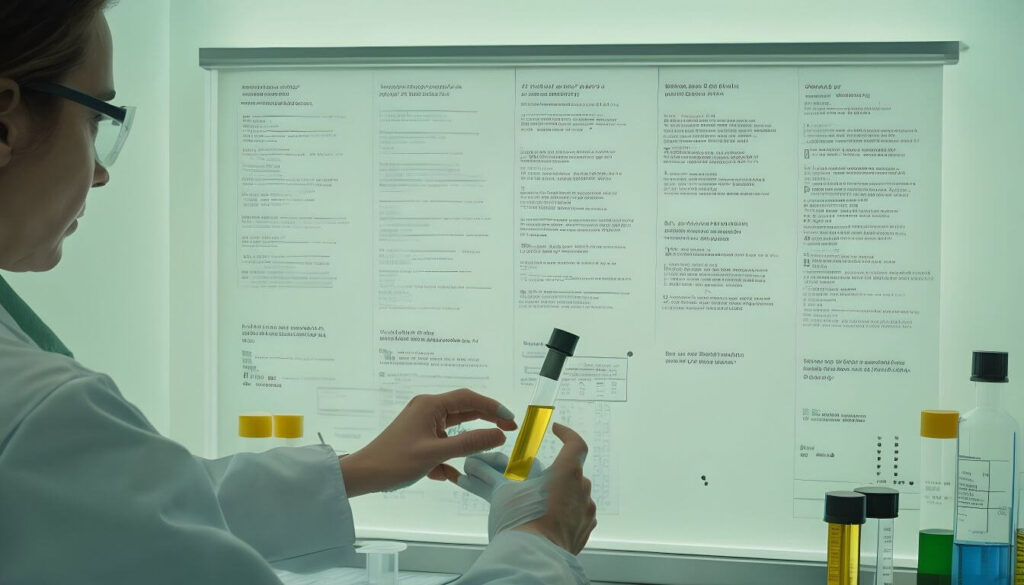Thinking about Delta-8 and drug examinations? Uncertain if the relaxed feeling carries any unforeseen shocks? Immerse yourself in our article as we reveal the truth: does delta-8 show up on a drug test? Let’s explore this fog together and acquire knowledge to remain worry-free without any sudden deviations.
Delta-8 THC and Drug Testing
Like its similar relative Delta-9 THC, Delta-8 THC can also cause positive outcomes on drug tests. For testing drugs, different techniques are used each having unique periods of detection.
Tests on urine, which are the usual kind, can identify Delta-8 THC up to two weeks after its consumption. The reasoning behind this is that both THC and the substances it transforms into get stored in cells of fat from where they slowly get released as time passes by. Conversely, blood tests carry a shorter detection time frame of approximately 48 hours, which makes them more appropriate for detecting recent usage.
The popularity of saliva tests is on the rise because they are not intrusive and can spot substances just after usage. Delta-8 THC, for instance, can be found in saliva about 24 to 72 hours following intake.
Hair tests can detect THC use for the longest period, possibly up to 90 days. This happens because as hair grows, residues of THC might get included in it.
It is very important for people who use Delta-8 THC to know about these detection periods, particularly if they are liable to drug testing. Many times, employers and legal authorities depend on these tests – understanding the detailed parts can assist users in making knowledgeable decisions about when to use Delta-8 THC products.

Factors Influencing Detection
The duration Delta-8 THC stays in your system can be influenced by various factors.
Frequency of use
Firstly, the frequency of use plays a crucial role. If you use it regularly, traces may linger longer. Dosage matters too; higher doses often take more time to clear. Your metabolism is a key player—faster metabolism generally leads to quicker elimination.
Method of consumption
The method of consumption also affects detection times. Ingesting Delta-8 through edibles might extend its presence compared to inhaling. Combining these factors creates a unique metabolic fingerprint for each individual.
Metabolism
Think of it like this: if you’re a frequent user of high doses with a slower metabolism, it’s like leaving a longer-lasting footprint. On the flip side, occasional use, smaller doses, and a speedy metabolism could mean a shorter detection window. Understanding this interplay can help gauge how long Delta-8 might be detectable in your system.
Legal and Employment Considerations
In states where Delta-8 THC resides in a legal gray area, users should tread cautiously due to potential legal implications. While some states permit its use, others might classify it as a controlled substance. This creates uncertainty and potential legal consequences, making it crucial for individuals to stay informed about local regulations.
For those subject to regular drug testing, the situation becomes even more complex. Traditional drug tests often don’t distinguish between Delta-8 THC and its more well-known counterpart, Delta-9 THC. This could lead to false positives and, subsequently, employment challenges. Individuals should consider the potential impact on their careers and weigh the risks associated with Delta-8 THC use.
Navigating this legal landscape requires a careful balance between personal choices and understanding the potential repercussions, especially in the context of employment and drug testing. Staying updated on local laws and employer policies becomes essential for those venturing into the realm of Delta-8 THC.
Minimizing Risks and Understanding Labels
When it comes to minimizing the risk of testing positive, diving into product labels is key. Seriously, those labels are like secret scrolls telling you what’s inside. First off, check the THC content – aim for Delta-8 products with lower levels. It’s like choosing the right gear for a mission.
Understanding the dance between Delta-8 and Delta-9 THC is key. Some products might have both, and that can be a tricky tango. Keep your eyes peeled for that on the label. Think of it as decoding the ingredients for a safe adventure.
Remember, being a label detective is all about self-preservation. If a product is murky on details, it’s like a red flag waving in the wind. Opt for brands that spill the tea on what’s in their goodies. Staying informed isn’t just savvy; it’s your ticket to a worry-free experience. So, decode those labels and stay smart – your peace of mind will thank you!





